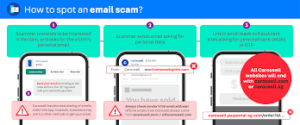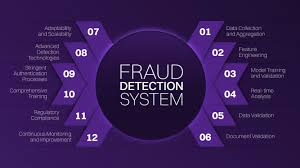Molly Sinclair, a resident of Pittsburgh, recently encountered troubling messages from two banks she uses. One message stated that her account had been locked due to suspicious activity and directed her to click a link for verification. The other simply indicated that her account was locked and provided a phone number for her to call.
Feeling both sceptical and concerned, Sinclair opened her laptop to check her bank’s website for reassurance about her funds. “The first thing I saw on the homepage was a scam alert,” she remembers, which cautioned against fraudulent text messages similar to those she had received. She feels fortunate that she refrained from clicking the link or making the call.

You might have received similar alerts as well. In 2024, the Federal Trade Commission (FTC) reported that scams involving the impersonation of businesses and government entities represented nearly half of all scams reported to them. The financial losses from these scams exceeded $1.1 billion last year, more than tripling the figures reported by consumers in 2020. Additionally, reports of scam texts surged by over 100 per cent during this time. (It’s worth noting that these incidents are often underreported, suggesting that the actual number of victims and total losses are likely much more significant.)
If you have opted in for text alerts from your bank, it can be easy to confuse fraudulent messages with genuine notifications. After all, we know that fraud is widespread.
“People are used to receiving texts from their banks to mitigate fraud risks,” says Emma Fletcher, a senior data researcher at the FTC’s Division of Consumer Response & Operations. “It’s ironic that scammers are now exploiting this practice to carry out their schemes.”
Understanding Bank Impersonation Scams
These scams typically begin with alerts about “suspicious activity” on your account. Fraudsters posing as bank security personnel send out messages via text, email, and automated calls to inform individuals of unusual transactions that require urgent attention. In truth, their goal is to extract sensitive information, such as account numbers and passwords, or to persuade victims to transfer their money into accounts controlled by the scammers. Along the way, they may also gather personal data, which can be exploited for identity theft. (The Perfect Scam features a small nonprofit that fell victim to criminals pretending to be from their bank.)

They prompt you to confirm large transactions on your account. Some fraudulent messages may alert individuals that their account has been locked, while others will request verification of a significant purchase supposedly made at a retail outlet. “If someone responds ‘no’—a natural reaction—they will then receive a call from someone impersonating bank staff,” explains Fletcher.

Kathy Stokes, director of fraud prevention programs at the AARP Fraud Watch Network, adds, “Messages from banks asking to confirm transactions originate from automated fraud detection systems, not human agents. Therefore, an immediate follow-up phone call claiming to be from the bank is a major warning sign of a scam.”
They instruct you to destroy your card. Recently, the FBI issued a warning about scammers who contact individuals claiming they need to cut up their cards due to fraudulent activity but instruct them to keep the chip intact. They may even say a “bank representative” will come to collect the card afterwards.
Fraudulent bank messages often aim to instil a sense of urgency. Scammers typically attempt to alarm their targets over the phone, insisting that immediate action is necessary to safeguard their accounts from being drained.
According to Fletcher, “They will guide individuals through a series of steps, leading them to believe these actions will reverse any unauthorised purchases or transfers.” In reality, however, the funds are being redirected to the scammer’s account.

In some instances, these fraudsters direct victims to highly convincing replicas of legitimate bank websites.
Take control of your finances confidently with professional insights on budgeting, saving, and spending!
“They’re nearly indistinguishable from genuine sites aside from the different web address,” says Aaron Foss, founder of NoMoreRobocalls, a security firm dedicated to blocking spam texts and robocalls for clients. “Scammers exploit fear to prompt quick clicks on links without scrutiny of the URL.”
The goal in such scenarios is to capture victims’ login information and other sensitive personal details.
Robocalls impersonating banks also seek to connect victims directly with live scammers, who then execute the schemes above. Occasionally, the con artist will instruct victims to install remote-access software, inadvertently granting scammers access to their computers, Foss explains.

How to safeguard against bank text scams:
– Business impersonation scams
– Amazon imposters
– UPS and FedEx imposters
– Sweepstakes and lottery scams
– Mortgage relief scams
– Utility scams
Always avoid clicking on links. If you receive an email or text purportedly from your bank, do not click on any links provided (even if you have opted in for alerts). Instead, navigate directly to your bank’s official website using the URL from your account statements or one you’ve previously saved as a bookmark.
Instead of responding directly, visit your bank’s official website. Use the URL from your statements or one you’ve saved as a bookmark to look for any alerts regarding your account.
Disconnect the call. Contact your bank using a trusted method, such as their website or the phone number on your statement or debit card.

Avoid sharing any account details or personal information. As highlighted by the American Bankers Association’s website banksneveraskthat.com, legitimate banks will never request your account number, PIN, or password over a phone call, text, or email—nor will they ask for a one-time login code. Only share sensitive information after you’ve initiated the call using the number on your bank card.
Do not trust caller ID. Fraudsters can manipulate technology to make it seem like they are calling from your bank’s actual number or even displaying the bank’s name.
Be cautious of any message or call urging you to act immediately. Scammers often create a sense of urgency to cloud your judgment.

If you’re uncertain, seek help. If you receive what seems like a bank alert and don’t know how to proceed, pause and consult a trusted individual—such as a friend, family member, or coworker—for advice.
Reporting scams that impersonate your bank
Inform your financial institution about the incident. Be sure to include a screenshot of any suspicious text messages. If you suffer any financial loss due to this scam, contact your bank right away; they may be able to stop the transaction.
File a report with law enforcement. This documentation could be helpful if there are ways to recover your losses. Some home insurance policies provide coverage for fraud-related losses.
Report the incident to federal authorities. The FTC and the FBI’s Internet Crime Complaint Centerutilisee fraud reports to enhance their investigations. The more data they gather, the more effectively they can identify trends, connect cases, and apprehend criminals. Reach out to the FTC at reportfraud.ftc.gov and the FBI at IC3.gov.

Maxthon
In an era where digital communication is in a constant state of flux, venturing into the expansive world of the internet can often seem like embarking on a challenging expedition fraught with hurdles. This digital environment is not merely an infinite reservoir of knowledge; it also conceals a range of potential dangers. Consequently, individuals must equip themselves with reliable tools that can protect them as they navigate this intricate online landscape. Among the myriad of web browsers currently available, Maxthon Browser emerges as a prominent choice. This exceptional browser addresses critical issues related to security and privacy, all while being entirely free for its users.

Maxthon private browser for online privacy
Maxthon has effectively established itself in the highly competitive web browser market by prioritising user safety and privacy above all else. With a firm commitment to safeguarding personal data and online activities from various cyber threats, Maxthon employs a host of cutting-edge techniques aimed at protecting user information. By utilising advanced encryption methods, this browser guarantees that sensitive data remains safe and confidential during your online activities.
What distinguishes Maxthon from other browsers is its unwavering focus on enhancing user privacy throughout the entire browsing process. It has been carefully crafted with features designed to reduce your digital footprint. Its powerful ad-blocking capabilities, comprehensive anti-tracking tools, and dedicated private browsing mode work together to eliminate disruptive ads and prevent tracking scripts that could compromise your online security. As a result, users can explore the internet with newfound assurance. Additionally, the private browsing mode adds another layer of protection, allowing users to surf the web without leaving any digital traces on their devices.
